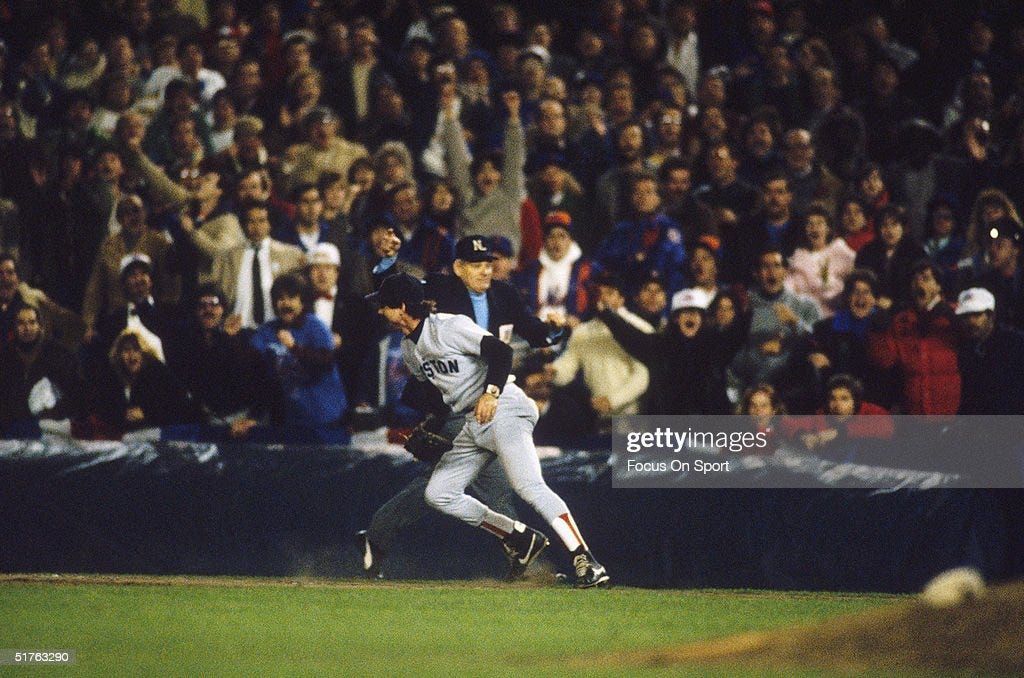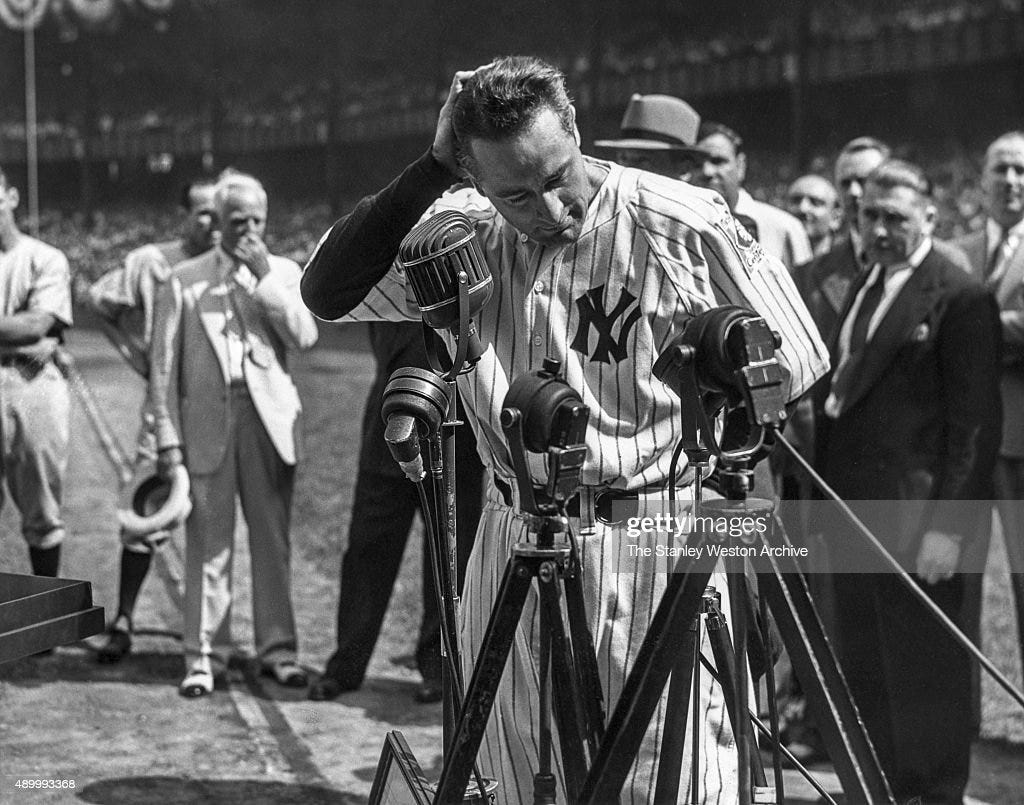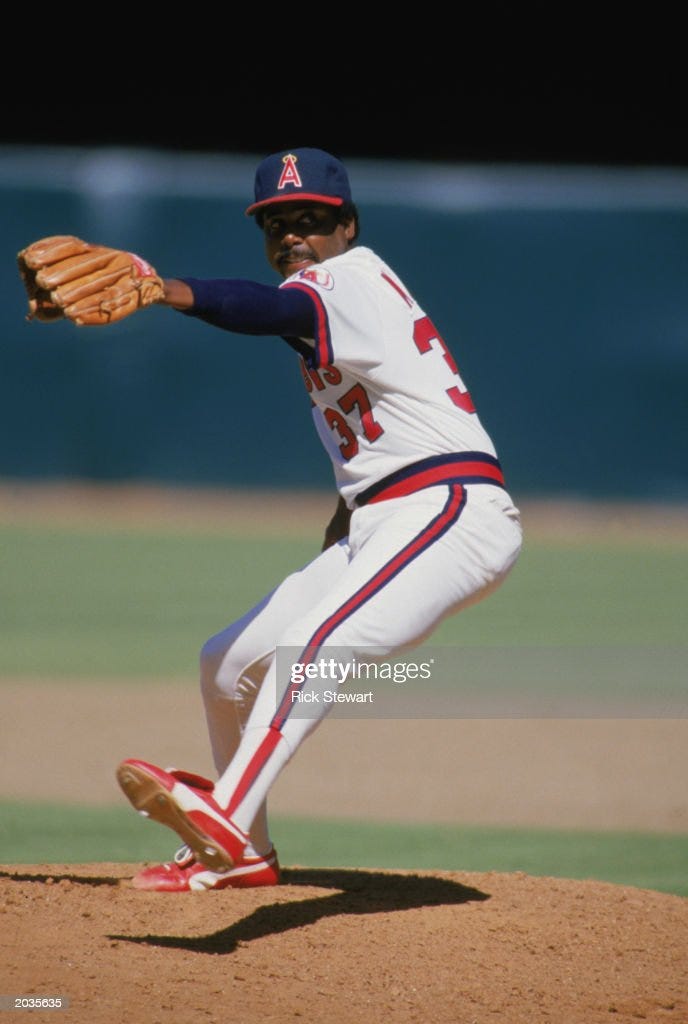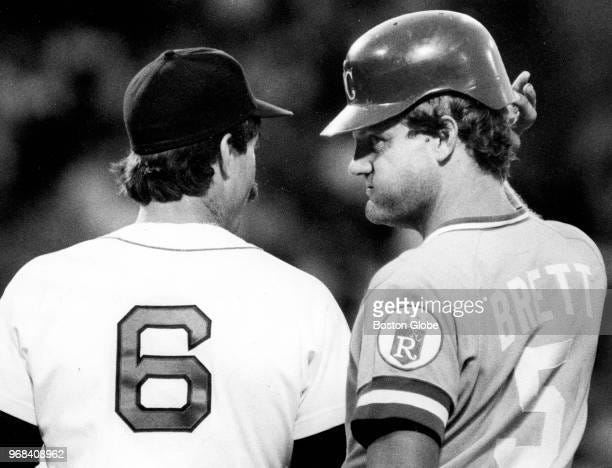
Last week in PBN, I explored the unbridled beauty of baseball by dissecting the single greatest moment I’ve ever witnessed on the diamond, Kirk Gibson’s unlikely game-winning home run in the 1988 World Series. But as I noted at the end of the article, even these moments of glory and ecstasy have a flip side, depending upon one’s perspective. Believe me, Oakland A’s fans viewed Gibby’s walk-off very differently than Dodgers fans.
So even cruelty can be relative in baseball. But cruelty can come in different degrees. For every iconic moment in the game’s history, there’s always a team and fanbase on the other side that feels jilted. And don’t get me wrong, that pain can linger and cement into bitterness, but there’s a big difference between losing on somebody else’s highlight reel play and costing yourself the game. That’s the real cruelty of baseball, when the lights are on and all eyes are focused on you, and you blow it.
There was none of that in the Gibson play. Sure, you could criticize Dennis Eckersley for not making a good enough pitch, but that’s baseball. Nothing crazy about that. You have to give the credit to Gibson. It was just an amazing play. That doesn’t make it hurt any less for A’s fans, but ultimately, you just have to shrug and admit that the other team beat you.
Or take a more recent example from my own personal baseball trauma file. The Royals reaching Game 7 of the 2014 World Series after making an improbable run that came out of nowhere was a remarkable achievement. But to get so close to a championship and fall just short was a hard pill to swallow. What can I say about it though? Madison Bumgarner had one of the greatest individual performances in World Series history and almost single-handedly lifted the Giants to the title. I think I have PTSD about it because I still cringe a little whenever I hear his name (especially if it’s coming out of Joe Buck’s mouth), but there’s nothing I can do except tip my cap and admit that he beat us. That’s just the way it goes sometimes, no matter what game you’re playing.
Of course, winning the World Series in 2015 took away a lot of the sting leftover from 2014. And I’m sure a lot of fans of the 1989 World Champion A’s would agree with that sentiment. Not every team gets that kind of a mulligan though. Like I said, cruelty comes in different degrees.
That brings us to the order of the day— the cruelest baseball moment I’ve ever witnessed. By nature, this would belong more on a blooper real than a highlight package. There can’t be a great play on the flip side, it has to be something that was entirely bungled.
I considered several different candidates that covered a wide range of scenarios. Steve Bartman’s interference at Wrigley in 2003. Don Denkinger’s missed call in the 1985 World Series. I even went off the field for a couple of other examples. Pete Rose’s lifetime ban in 1989. Or perhaps the darkest moment in MLB history, the 1994 Strike and cancellation of the World Series. You could also include Lou Gehrig’s ALS diagnosis and “luckiest man” farewell speech, although that feels more like a life is cruel example than a hard-luck baseball story.

None of those felt right. We can argue over whether the Bartman and Denkinger incidents were overblown (and I’ve made my case for both), but there’s no doubt they had a negative impact on their respective games. But it didn’t feel right singling out a fan or an ump. No doubt they can have a major effect on the game, and I’m not trying to downplay their ability to impose heartbreak, but it felt like this moment had to come organically on the field. That’s also why I ruled out Rose’s off the field stuff. (Also, he brought it on himself.) As for the Strike, arguably the worst day in baseball history, well, that’s a subject all to its own. In the end, there was only one real choice, and it was obvious from the start.
Bill Buckner is remembered for one thing, and that is the ball rolling through his legs in the bottom of the tenth inning in Game 6 of the 1986 World Series. This is one of the most unfair facts in baseball history, but it doesn’t make it any less true. And that’s a shame, because Buckner is also one of the most likeable and easy to root for players you’re ever likely to come across, and not just because of his incredibly prominent eyebrows and mustache.
The man played in four decades, starting his career with the Dodgers as an outfielder in 1969. He was a solid player in L.A., but really found his groove when he was traded to the Cubs in 1977. Shifting to 1B, he broke the position’s assist record in 1982, hit over .300 four times and won the NL batting title in 1980 with a .324 average. He made his only All-Star Game in 1981, and was eventually inducted into the Cubs Hall of Fame. By 1984, however, his knees were getting worse and worse, and Leon Durham was taking more of his playing time at first. At odds with management, they blinked first and traded him to Boston.
The long-suffering Red Sox were in the midst of the fabled “Curse of the Bambino.” They had not won a World Series since 1918, but Buckner arrived to a clubhouse that had all the makings to become a juggernaut. The team was loaded with future Hall of Famers and All-Stars like Wade Boggs, Jim Rice, Dwight Evans, Mike Greenwell, Don Baylor, and Dave Henderson. And a strong pitching staff was buoyed by an up-and-coming phenom named Roger Clemens. The Sox appeared to have all the pieces to finally get over the hump.
Buckner hit the ground running in Boston, fitting in and producing immediately. In his first full season in 1985, he started all 162 games and broke his own record for first basemen assists. He also hit .299 with 16 HR, 110 RBI, 201 H, and 46 doubles. The Red Sox finished .500 that season, but in 1986, Boston put it all together.
The Red Sox won 95 games and the AL East in 1986. There was only one red flag as the team headed into the postseason. By that time, Buckner’s knees were completely shot. His numbers dipped a little, but even in his hobbled state, they were still respectable. He hit .267 with 18 HR, 102 RBI, and 39 Doubles. But the key side effect of his knee problems was that he was often replaced in late-inning situations by Dave Stapleton, a superior defender. Keep that in mind. If you’re one of the handful of people on the planet who don’t know what’s coming, it’s important.
Of course, Buckner’s fateful World Series moment very nearly never came to be. The Red Sox were down three games to one in the 1986 ALCS to the Angels. In the ninth inning of Game 5 in Anaheim, with the Sox down a run and facing their final out, Dave Henderson launched a two-run home run off of Angels closer Donnie Moore, giving the Red Sox the lead. The Angels actually scored a run in the bottom of the ninth to tie the game, but Henderson hit a sac fly off of Moore in the eleventh, winning the game and staving off elimination.
I actually considered Hendu’s home run off of Moore for my cruelest moment, considering its tragic aftermath. Three years later, Moore shot his wife. Fortunately, she survived, but he did not. After she fled to the hospital, he committed suicide in front of his kids. So yeah, pretty messed up. But Moore was an abusive husband who had battled his own demons for years, and while that home run probably didn’t help, it was not the thing that caused him to crack.

It was the turning point in the series, however. Returning to Boston, the Sox won games 6 and 7, setting up a date with the Mets in the World Series. Despite the fact that the Red Sox were on the verge of making history, most of the hype was centered around the Mets, and with good reason. The Mets were as loaded with talent (and other substances) as the Red Sox, if not more, with a lineup that featured Darryl Strawberry, Keith Hernandez, Gary Carter, and Lenny Dykstra, and a pitching staff that consisted of Doc Gooden, Ron Darling, Sid Fernandez, and Bobby Ojeda. They ran away with NL East, winning 108 games, and after surviving the Astros in a fantastic NLCS, everyone expected them to lock up their second World Series championship.
The Red Sox did not stick to the script though. They jumped out to a 2-0 series lead, taking the first two games in New York. On the verge of elimination and catastrophic failure, the Mets managed to take two out of three at Fenway and get the series back to Shea Stadium, setting up Game 6 and Buckner’s blunder.
It’s unfair to lay it all on Buckner. There was a lot of blame to spread around. The game was tied 3-3 after nine innings, but Boston scored two runs in the top of the tenth to take a 5-3 lead. They were three outs away from getting the monkey off their back. Then Boston manager John McNamara went to work, making two regrettable decisions that would directly and indirectly contribute to Buckner’s nightmare moment and Boston infamy.
Sensing victory within their reach, he chose to leave Buckner in at 1B, despite his bad knees and defensive liabilities. He did this because he wanted to the extremely likeable Buckner to be on the field for the final out and celebration, even though he’d regularly replaced him with Dave Stapleton throughout the season, and in Games 1, 2, and 5 of the World Series.
The second decision was sticking with relief pitcher Calvin Schiraldi in the bottom of the tenth, after things started to get away from him. Perhaps McNamara was simply too sentimental. Schiraldi was a former Met who wanted to earn the final outs and celebrate a title on his former team’s field, and the inning started out well enough. He retired the first two batters, Wally Backman and Hernandez, to put Boston within one out of a title. Then things took a turn.
Gary Carter singled to keep the Mets alive. The normally squeaky-clean Carter barked to the first base coach that there was “no fucking way” he was getting the last out of the World Series, and the Mets got it rolling. Kevin Mitchell and Ray Knight followed Carter’s hit with singles of their own. Knight’s hit scored Carter, putting the Mets within one, and advanced Mitchell to third. Having finally seen enough, McNamara yanked Schiraldi and brought in Bob Stanley to close it out.
Mookie Wilson stepped into the box for the most important at-bat of his life. If you’ve ever heard Mookie’s famous quote about dinosaurs (not actually real, but priceless nevertheless), you know there was no way he was going to come up short, but at the time, the tension was thick. Wilson put together a masterful plate appearance, working the count full after falling behind, and fouling off ball after ball until he had seen nine pitches. In the midst of this, Stanley threw a wild pitch and Mitchell scored, tying the game. Almost as important as that, Ray Knight advanced to second.
Stanley stepped on the rubber for his tenth pitch. This was the legendary Vin Scully’s call. “So the winning run is at second base with two outs, three to two to Mookie Wilson. Little roller up first…BEHIND THE BAG! IT GETS THROUGH BUCKNER! HERE COMES KNIGHT AND THE METS WIN IT!” This was followed nearly three minutes of silence from the broadcast booth as Scully let the pandemonium of Shea speak for itself.
I remember watching on the floor of my living room in rural Kansas, in the same exact spot I had watched the controversial Denkinger call and Darryl Motley’s clinching home run when my Royals won the World Series a year earlier. I was still coming to grips with the reality that the Royals wouldn’t be playing in the Fall Classic every season (talk about cruelty), but I was awestruck all the same.
For the purposes of transparency, I admit that I was rooting for the Mets in that series. They were a more exciting team to seven-year-old me, and it was hard not to get caught up in their vibe. So I was happy that they won, and even happier that we would get one more game that season, but watching a dejected Buckner shuffle off the field amidst the other Red Sox, I still felt horrible for the guy. Even seven-year-old me knew that was a moment you just don’t bounce back from.
Buckner, to his credit, never shied away from his mistake. He was always willing to talk about it and own up to the error, whether right after the game or years later. It didn’t matter. Even though he did nothing to cost the Red Sox the deciding Game 7 of the Series, he was the scapegoat. Boston fans turned on him, showering him with abuse and death threats, generally trying to make his life as miserable as possible.
He was traded to California the following season and bounced around to a couple of more stops, including two seasons in Kansas City, before ironically returning to Boston for his final season in 1990. True forgiveness from the fanbase would not come until 2004 though, when the Red Sox finally broke the “Curse of the Bambino” and won the World Series, breaking an eighty-six-year drought. In the aftermath, the Red Sox formally invited him back for a press conference.
An emotional Buckner acknowledged the toll it had taken on him over the years. He should have never had to deal with most of the crap that was sent his way. It’s one thing to hold players accountable for mistakes on the field, but the abuse heaped on Buckner for decades is a prime example of how we often take sports way too seriously.
Buckner took it all in stride, and even managed to have a sense of humor about it. Perhaps most notably, he later appeared on an episode of Curb Your Enthusiasm where he misses another ball through the legs, but then later manages to catch a baby thrown from a burning building. Stuff like that showed that Buckner was able to rise above all the adversity, and I think it redeemed him in the eyes of a lot of people. Yes, that one play will never go away, but it reminded everyone why he had been such a fan favorite to begin with. And for those few a-holes who could never let it go, well, Buckner’s friends had his back.
There’s a good story about George Brett and Buckner going to a strip club in Cleveland in 1987. The doorman recognized Brett right away, but not Buckner. But after some morons started giving Buckner crap about the ’86 Series, the doorman took it upon himself to give the two ballplayers a private table and some drinks on the house. Brett was impressed, and asked if the guy was interested in going to the game the next day. The doorman said, “Sure,” and the next day a limo arrived with two tickets and a hundred-dollar bill. The doorman never actually saw Brett again, but from that day on, anytime the Royals were in Cleveland, two tickets and a hundred-dollar bill showed up at the guy’s door.

But perhaps the weirdest detail of the whole Buckner saga predated the actual incident by two years. After trading Buckner to the Red Sox, the Cubs, who were battling their own curse, ended years of futility and won the NL East. They played the Padres in the NLCS. Leading 3-2 in the decisive Game 5, Leon Durham, the guy the Cubs had replaced Buckner with, in no small part because of his defensive abilities, misplayed a roller down the first base line that was almost identical to the play Buckner would miss in 1986, costing the Cubs the lead and a berth in the World Series.
I don’t believe in fate, but it’s almost like the moment was seeking Buckner out. He dodged the bullet in 1984, but it was impossible for him to run from it forever. No matter what we do, sometimes the cruelty of the universe is inescapable.
Even on a baseball diamond.
Thanks again for reading Powder Blue Nostalgia. If it’s not too painful to relive them, tell me about the baseball moments that broke your heart in the comments. And hit the subscribe button to read about better baseball memories every week.




I'm surprised that Bobby Thomson's Shot Heard Around The World off Ralph Branca in the 1951 playoff between the Giants and the Dodgers wasn't even considered. To this day, surviving Brooklyn Dodger fans cringe at the memory, and Branca was arguably the original Bill Buckner in the story.
Great article but I think Buckner was always an unjust scapegoat. McNamara definitely was wrong leaving Schiraldi in too long, and not putting Stapleton in for defense. But Stanley did still blow the lead w the wild pitch. He was also slow covering 1B, could've been why Buckner took his eye off the ball for a split second. If he fields cleanly, Mookie has an infield hit; runners on the corners 2 outs tie game. To me, the wild pitch was worse than the E-3.